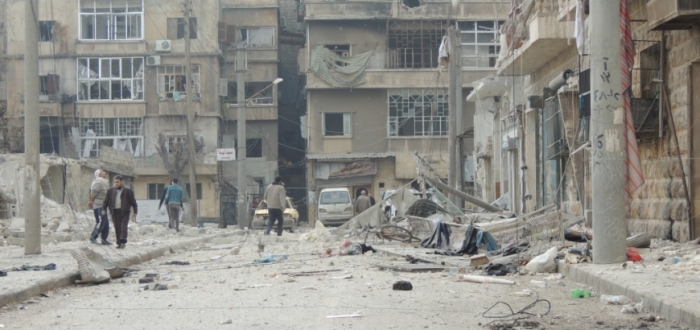The sounds of the bombardment of my hometown of Dael differed according to whether it was night or day.
First came the intense shelling.
This would start at nightfall, when the lack of light and electricity would increase our sense of fear. My family and I would gather together and sit in silence, listening to the air raids and missiles. All we could do was pray for our safety.
Then came brief lulls.
Despite the fact that we were still alive, those minutes of silence felt like long hours. The echo of the shelling would still be ringing in our ears. We would sit there thinking of the people who were now buried beneath the rubble of their homes. Some of them would have lost limbs, others would be dead. Their remaining family members would be frantically searching for them.
The break of dawn would be accompanied by a new sound: helicopters.
They circled over the town, dropping barrel bombs indiscriminately. There were huge explosions and massive destruction.
This systematic bombardment forced Dael’s schools to operate for only two hours a day. Classes started at seven in the morning and ended at nine. The system was put into practice out of concern for the safety of our children.
One day, an hour after my two sons had left for school, government helicopters dropped a barrel bomb on our neighborhood. I looked out of the window and saw plumes of smoke rising from the direction of the secondary school my eldest attended.
I ran out of my house and joined the crowds of people rushing towards the school to find loved ones and offer help to the injured.
I prayed for the safety of the students and their teachers, they were innocents whose only crime was pursuing or sharing knowledge. Perhaps the regime felt threatened by this and had therefore targeted their school.
When I reached the building I saw children pouring out of it, evacuating in case of a second strike. The government was known for its tactic of bombing the same location twice to kill the largest number of civilians possible; those inside the building as well as those who had gathered to help them.
Someone told me that a man in his 50s had been martyred waiting at the school to pick up his only granddaughter. I later heard that the girl had also been badly injured. Her family had tried to take her to Jordan for treatment but they were refused entry at the border.
I couldn’t find my son so I made my way back to my house. I walked past a damaged car; its roof had been blown off and there was a body inside that someone had covered with a sheet.
By the time I got home I was in a state of panic. What if one of the dead bodies was my relative? Or my son?
I tried to pull myself together, but I couldn’t.
I wished I hadn’t sent my boys to school. I wished I had taken them somewhere safe.
Thankfully my anguish didn’t last long. One of my nephews, who went to the same school as my eldest son, stopped by my house on his way home. He had not been harmed and he reassured me that my son was also fine and on his way home.
That day, my younger son who was in primary school came home later than usual. Instead of taking his usual shortcut, he had gone out of his way to walk to the secondary school to see what devastation the attack had wrought.
My young son changed that day. He no longer seemed frightened.
Perhaps it was an act, but he no longer screamed when he heard an explosion. Instead he counted the missiles and bombs, and started collecting different types of spent ammunition as if they were treasures.
The hit on the secondary school happened to other schools. Parents stopped sending their children out of doors, so most schools shut down.
I could no longer bear to sit at home and wait for our fate while listening to the sounds of war outside.
I decided to leave the country.
Perhaps I was being selfish, but I needed to keep my sons safe. I wanted to ensure that they had a better future, which did not involve counting missiles and bombs.
Hala al-Homsi is the pseudonym of a Damascus Bureau contributor from Daraa, Syria. The 42-year-old is married with two sons and used to work in the education sector. She lost her job when the revolution erupted and later fled the country along with her family.
This article was republished at a special agreement with Damascus Bureau.


